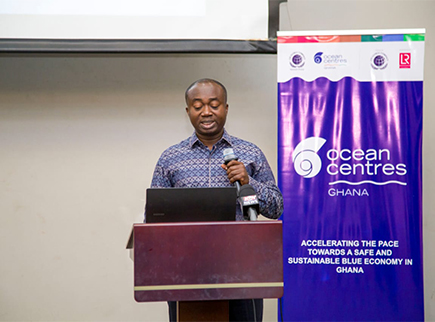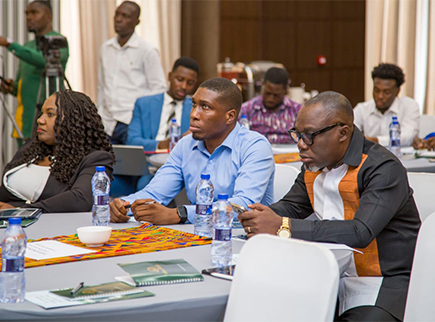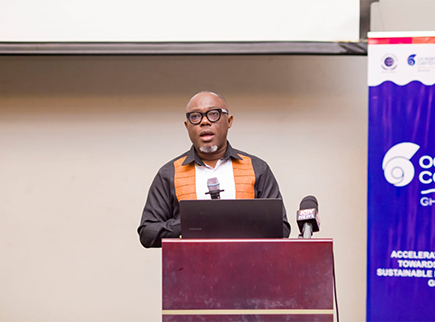Ocean Centres Ghana, hosted by UN Global Compact Network Ghana and supported by Lloyd’s Register Foundation, has launched the first in a series of multi-stakeholder workshops to discuss safety and sustainability in the blue economy.
The maiden workshop on the theme: “Navigating a Safer & Greener Future: Integrating Sustainability and Safety in Port and Shipping Operations” brought together public agencies, industry leaders, academia, labour unions, financial institutions, and other maritime stakeholders to discuss and develop Ghana-focused recommendations for embedding safety and sustainability across port and shipping operations.
Speaking at the event, Professor Randsford Edward Gyampo, Acting Chief Executive Officer of the Ghana Shippers Authority, urged Ghanaian shippers to position themselves to meet current supply chain demands or risk exclusion from greener markets.
“Multinational buyers are already requiring lower carbon logistics as part of their supply chain standards.
So sustainability measures that improve efficiency from digitalised customs to modern vessel traffic system also build resistance for exportation of food, horticulture, of fish. Resilience in logistics is the difference between profit and loss, between assets and protection in foreign markets,” he said.
He called for collaboration among shippers, including sharing data, co-designing policies, and engaging in multi-stakeholder platforms to ensure solutions were practical and cost-sensitive.
“We must work with stakeholders in achieving some of these things. We must not seem to be fighting. And the practice of lack of inter-agency collaboration should be minimised if we really want to engage closer towards this vision as espoused in the theme,” Prof Gyampo said.

He said Investments in efficient and sustainable operations would deliver long-term savings, stability and competitiveness.
He urged shippers not to disproportionately pass on green ports fees, carbon leaps and compliance measures to cargo holders.
“Efficiency must be safeguarded because greener infrastructure that slows cargo turnaround risks diverting flows to competing ports in arbitrary domain or neighbours. Regulations must also align with international conventions,” he said.
“When Ghana’s ports and shipping operations are safe and sustainable, exporters gain confidence and market access. Importers benefit from reliable supply chains. SMEs remain competitive despite tight margins,” he said.
“Workers gain from training and a stronger safety culture. At the level of the national economy, it would earn more stable revenues and reinforce its reputation as a credible trade hub in West Africa.
“The path to a safer and greener maritime future will not be simple, but it is necessary. The choices we make now in policy, in investments, in partnerships will determine whether our dear nation Ghana is left behind or whether our country will become a leader in Africa,” he added.
Nana Boakye Boampong, Country Lead, Oceans Ghana said the blue economy played vital roles in the lives of most people or even countries.
In Ghana, for instance, about 6-7% of GDP is hinged on the activities in the oceans.
He said the Oceans Centre, an initiative by the United Nations Global Compact and the Lloyds Register Foundation, served as a multi-stakeholder engagement platform to channel safety and sustainability in the operations blue economy.
He said the workshop was necessary to build consensus and come out with local recommendations that would help address the gaps and improve the safety and sustainability in the oceans industry.
He said the industry was dynamic and there were current strategies looking at climate impacts and greenhouse emissions in transportation in the blue economy.
For instance, the International Maritime Organization has recently adopted a greenhouse gas strategy, which aims to reduce shipping’s carbon footprint.
“This comes with changes in fuel. Shipping is going to move from burning the fossil fuels that they are used to.
They are now looking at ammonia, which is very corrosive, methanol, LNG, and other fuel sources. All these come with inherent safety issues,” he said.

He said in all this, there was the need to develop the safety measures for the seafarers who work on board the ships, and also for the vessels themselves, and even the safety of the cargo.
Tolu Kweku Lacroix, the Executive Director, UN Global Compact Network Ghana, said there would be about seven more workshops looking at different sectors of the maritime or blue economy to identify the pressing issues and to find solutions from experts in the Ghanaian sector.
“That way we can build upon that to shape our recommendations for policy makers to make the best decisions for the industry going forward,” he said.
He said the goal was to get the different stakeholders to collaborate and bring a far more robust blue economy blueprint to enhance efficiency.
“So, this initiative in its totality is part of a larger initiative to fully integrate the SDGs into our operations as an industry,” he added.
Beth Elliot, Director of Strategic Communications, Lloyds Register, said ocean workers faced more risks compared to those in other industries, adding that the crew needed training and mental health support.
One of such big risks is extreme and erratic weather patterns around the world, which are negatively impacting ports facilities.

